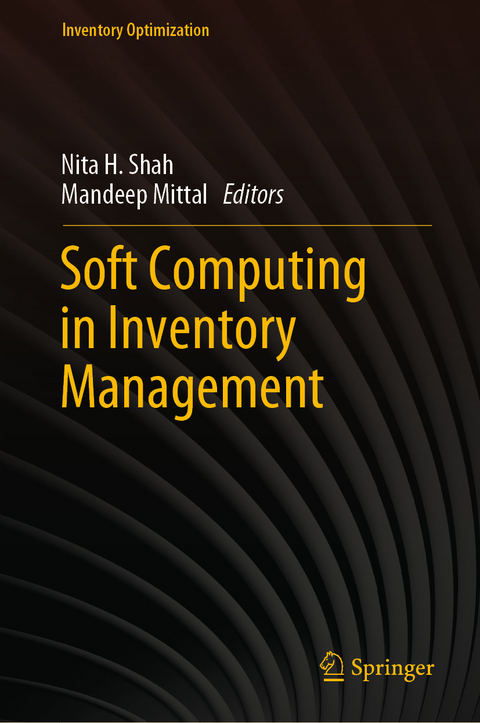
Soft Computing in Inventory Management
Springer Verlag, Singapore
978-981-16-2155-0 (ISBN)
This book presents a collection of mathematical models that deals with the real scenario in the industries. The primary objective of this book is to explore various effective methods for inventory control and management using soft computing techniques. Inventory control and management is a very tedious task faced by all the organizations in any sector of the economy. It makes decisions for policies, activities, and procedures in order to make sure that the right amount of each item is held in stock at any time. Many industries suffer from indiscipline while ordering and production mismatch. It is essential to provide best ordering policy to control such kind of mismatch in the industries. All the mathematical model solutions are provided with the help of various soft computing optimization techniques to determine optimal ordering policy.
This book is beneficial for practitioners, educators, and researchers. It is also helpful for retailers/managers for improving business functions and making more accurate and realistic decisions.
Prof. Nita H. Shah heads the Department of Mathematics in Gujarat University, India. She is a post-doctoral visiting research fellow of University of New Brunswick, Canada. Prof. Nita's research interests include inventory modeling in supply chain, robotic modeling, mathematical modeling of infectious diseases, image processing, dynamical systems and its applications etc. She has completed 3-UGC sponsored projects. She has published 13 monograph, 5 textbooks, and 475+ peer-reviewed research papers. Her five edited books have been published by international publishers such as Springer. She has guided 28 Ph.D. students and 15 M.Phil. students till now. She has travelled in USA, Singapore, Canada, South Africa, Malaysia, and Indonesia for lectures and visiting faculty posts. She is Vice-President of Operational Research Society of India, and council member of Indian Mathematical Society. Dr. Mandeep Mittal started his career in the education industry in 2000with Amity Group. Currently, he is working as Head and Associate Professor in the Department of Mathematics, Amity Institute of Applied Sciences, Amity University Uttar Pradesh, Noida. He earned his post-doctorate from Hanyang University, South Korea, in 2016, Ph.D. (2012) from the University of Delhi, India, and post-graduation in Applied Mathematics from IIT Roorkee, India (2000). He has published more than 70 research papers in international journals and proceedings papers in international conferences. He has co-edited five research books with international publishers such as Springer. Awarded the Best Faculty Award by the Amity School of Engineering and Technology, New Delhi for the year 2016–2017, he has so far guided four Ph.D. scholars, and 4 students working with him in the area of Inventory Control and Management. He also served as Dean of Students Activities at Amity School of Engineering and Technology, Delhi, for nine years, and worked as Head, Department of Mathematics inthe same institute for a year. He is a member of editorial boards of Revista Investigacion Operacional, Journal of Control and Systems Engineering, and Journal of Advances in Management Sciences and Information Systems.
Chapter 1. Retailer’s Optimal Ordering Policy under Supplier Credits when Demand is Fuzzy and Cloud Fuzzy.- Chapter 2. An Application of PSO to Study joint policies of an Inventory Model with Demand Sensitive to Trade credit and Selling price while Deterioration of item being controlled using Preventive Technique.- Chapter 3. Optimization of the Berth allocation problem to the vessels using priority queuing systems.- Chapter 4. Fuzzy Inventory Model for Deteriorating Items in a Supply Chain System with Time Dependent Demand Rate.- Chapter 5. Credit financing in a two-warehouse inventory model with fuzzy deterioration and weibull demand.- Chapter 6. Two-Warehouse Inventory of Sugar industry Model for Deteriorating Items with Inflation using Differential Evolution.- Chapter 7. A Stackelberg Game Approach: In Supply Chain for Imperfect Quality Items with Learning Effect in Fuzzy Environment.- Chapter 8. An analytic and Genetic Algorithm Approach to optimize Integrated Production-InventoryModel under time-varying Demand.- Chapter 9. Sustainable Inventory Model with Carbon Emission Dependent Demand under Different Carbon Emission Policies.- Chapter 10. Impact of two different trade credits options on a supply chain with joint and independent decision under trapezoidal demand.- Chapter 11. A Co-Ordinated Single-Vendor Single-Buyer Inventory System with Deterioration and Freight Discounts.
| Erscheinungsdatum | 03.09.2021 |
|---|---|
| Reihe/Serie | Inventory Optimization |
| Zusatzinfo | 37 Illustrations, color; 22 Illustrations, black and white; IX, 224 p. 59 illus., 37 illus. in color. |
| Verlagsort | Singapore |
| Sprache | englisch |
| Maße | 155 x 235 mm |
| Themenwelt | Informatik ► Theorie / Studium ► Künstliche Intelligenz / Robotik |
| Mathematik / Informatik ► Mathematik ► Finanz- / Wirtschaftsmathematik | |
| Wirtschaft ► Allgemeines / Lexika | |
| Wirtschaft ► Betriebswirtschaft / Management ► Unternehmensführung / Management | |
| ISBN-10 | 981-16-2155-1 / 9811621551 |
| ISBN-13 | 978-981-16-2155-0 / 9789811621550 |
| Zustand | Neuware |
| Informationen gemäß Produktsicherheitsverordnung (GPSR) | |
| Haben Sie eine Frage zum Produkt? |
aus dem Bereich


